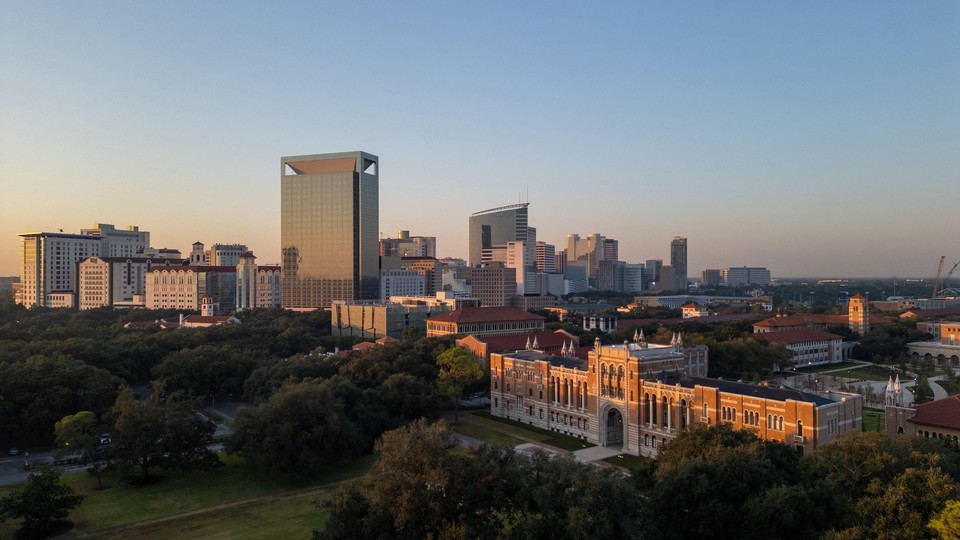Better Salary, Better Career, Better Growth: Your MBA’s ROI

An MBA is not just a degree; it's a strategic investment you make in yourself — two years of time, money and effort for a lifetime of dividends. At Rice Business we make it easy for you to enjoy your return on investment. But don’t just take our word for it; the numbers show a high financial ROI.
Let's boil it down.
What will my MBA cost me?
- Tuition: The first and one of the biggest expenses is, of course, tuition. At Rice, the annual tuition is $73,500 for the two-year degree. This means that students will pay roughly $150,000 for their MBA.
- Opportunity cost: Another significant expense, especially for the full-time program, is opportunity cost. Prior to entering the program, our students typically have a $70,000 salary. Meaning: for the two-year degree, the opportunity cost of not having that full-time job is roughly $140,000.
These seem like daunting numbers for any prospective student. However, with every investment, there comes a payout and an MBA degree gains more than most.
What are the financial benefits of an MBA?
- Starting salary: First, upon graduation, Rice MBAs see a significant rise in their starting salaries. The median starting salary for one of our MBAs is $157,000 — representing a 124% raise from the $70,000 salary they previously had.
- Future growth: Beyond the initial salary increase, MBAs experience accelerated growth rates compared to those without. Non-MBA salaries grow at a rate of roughly 2.5%, compared to an MBA’s growth rate of 3.5%. This higher rate provides significant long-term benefits.
How will this look over the next 30 years?
Let’s consider all variables: cost, salaries, a ballpark figure of 25% income tax and, to calculate the time value of money, let’s say a 10% discount rate. Now, we have all the factors for a final investment proposal.
- Without an MBA: With a starting salary of $70,000 growing at a rate of 2.5% for 30 years, factoring in taxes and a discount rate of 10%, the present value of your future salary without an MBA would be $631,250.
- With an MBA: Starting with a salary of $157,000 growing at a rate of 3.5% for 30 years under the same tax and discount conditions would result in a present value of future salary of $1,041,491. In other words, the MBA provides a net present value of $410,241 and a final ROI of 20%.
Present any company with an investment that would generate a $410,000 return, or 20% ROI, and you’re getting promoted! This is the truth of getting an MBA. The net present value of the degree is just about the highest ROI you can find in academia. And Rice Business can help you get there.
Let’s look at the ROI for a Rice MBA, specifically.
| Costs | |
| Tuition (2 years) | $147,000 |
| Opportunity cost (2 years lost salary) | $140,000 |
| Total cost | $287,000 |
| Benefits | |
| Post-MBA starting salary (2 years) | $314,000 |
| Salary Growth Rates | |
| Non-MBA | 2.5% |
| MBA | 3.5% |
| Financial Analysis (30 Years - Rough) | |
| Tax Rate | 25% |
| Discount Rate | 10% |
| Present Value of Future Salaries | |
| Non-MBA | $631,250 |
| MBA | $1,041,491 |
| Net Present Value | |
| MBA – Non-MBA = NPV | 1,041,491 - 631,250 = NPV |
| Net Present Value | $410,241 |
| Return on Investment (ROI) | 20% |
Simpler Version
| MBA (Y/N) | Starting Salary | Growth Rate | Present Value (30 Years) | Net Present Value |
| No | $70,000 | 2.5% | $631,250 | - |
| Yes | $157,000 | 3.5% | $1,041,491 | $410,241 |
Interested in Rice Business?
Additional Considerations:
Everyone’s financial situation is unique, so this breakdown does not include loan and interest payments. (We discuss those here.)
It also does not include additional benefits like sign-on bonuses and stock options. (In 2022, the average starting bonus for a Rice MBA was $35,879.)
But even with just these numbers, it’s clear that pursuing an MBA is not only personally transformative — it also comes with considerable financial and career growth potential. We invite you to invest in your future today and join us at the Jones Graduate School of Business.
In this video, you can watch James Weston (Harmon Whittington Professor of Finance) break down the ROI of a Rice MBA:


